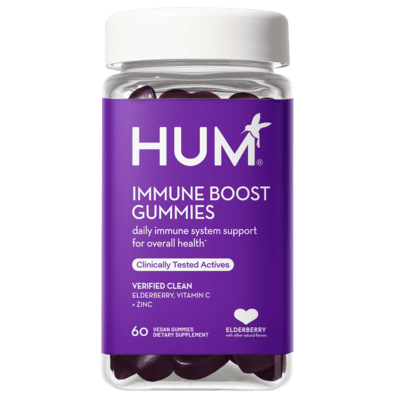We asked four doctors how they boost their immunity on a daily basis. Here’s what they shared.
As Dr. Rachel Eva Dew points out, the immune system is the body’s natural defense system. “The body is designed to fight off [antigens] and heal itself,” she says. However, it’s only able to do so when it’s fully supported.
As she continues, things get more complicated when the immune system is worn down, depleted, or compromised. Because of this, it’s important to know how to optimize immune function.
Fortunately, we chatted with four doctors to find out exactly how they do so themselves.
 Wondering what foods are on Dr. Dew’s no-go list? She advises steering clear of:
Wondering what foods are on Dr. Dew’s no-go list? She advises steering clear of:



How 4 Doctors Boost Their Immunity
Keep reading to uncover four perspectives from doctors on how they boost their immunity and protect their overall health.1. Rachel Eva Dew, DNM, DIM, PhD
Dr. Rachel Eva Dew is a double-board certified doctor of natural and integrative medicine and the co-founder of ModiHealth, the first integrative telehealth service. Since her entire life centers around medicine, she’s incredibly mindful of how she tends to her immune system. After all, in her eyes, strengthening the immune system is a critical part of care. For her, the best way to do so is by focusing on what you do and don’t eat. “You may have heard the saying ‘food is medicine,’ and I agree with this wholeheartedly,” she explains. “I would also add that the wrong foods can deplete your immune system.” Wondering what foods are on Dr. Dew’s no-go list? She advises steering clear of:
Wondering what foods are on Dr. Dew’s no-go list? She advises steering clear of:
- processed foods filled with chemicals + preservatives
- fast food
- animal products treated with antibiotics + hormones
- excess high glycemic index carbohydrates
- dairy products
- refined sugar
- alcohol
- caffeine
- get plenty of sleep
- exercise regularly
- meditate when possible
- not overwork yourself to the point where you avoid resting
2. Ryan Greene, DO, MS
Dr. Ryan Greene—a doctor of osteopathic medicine as well as the founder and managing partner of Monarch Athletic Club in West Hollywood—focuses on four main categories to keep his immune system in check:- diet
- sleep
- exercise
- hydration
Diet
As far as food is concerned, Dr. Greene relies on intermittent fasting; he aims for a 14-hour fast and a 10-hour eating window daily. He also strives to get adequate protein by sticking to a whole-food, primarily plant-based diet. “With regards to gut health, the immune system, and health in general, this is the most effective and best-studied eating style,” he shares. That said, he doesn’t nix meat completely. “I will eat high-quality animal protein, but sparingly,” he says, noting that it’s typically no more than two servings a week.
Movement
Dr. Greene moves his body daily to ensure that his mental and physical healthy stay in tip-top shape. “I try to make sure I get some resistance training in as well as cardiovascular stress daily,” she shares. “It clears my mind and improves my mood, as well as continues to support healthy metabolic function.” While some folks would advise against working out daily—because recovery is essential—Dr. Green says it doesn’t have to be intense; he just tries to break a sweat.Sleep
No healthy routine is complete without adequate sleep. “Sleep duration and quality are important—if not the most important activity a human can do to maintain optimal health,” Dr. Greene says, admitting that he needs to work on his sleep patterns. “Aiming for quality hours (uninterrupted) nightly with appropriate sleep hygiene (similar bedtime/wake time/darkroom/white noise) will make a world of difference in regards to how I function daily.”Hydration
Last but not least, there’s hydration. Forget about a simple eight glasses: Dr. Greene aims to drink half his body weight in ounces of water a day. “This will support healthy metabolic function, energy production, and immune system support,” he explains.3. Vivek Cherian, MD
Dr. Vivek Cherian is an internal medicine physician affiliated with the University of Maryland Medical System. In his eyes, choosing to lead a well-rounded healthy lifestyle is the most important thing you can do to protect your immune system. He does so by prescribing to plenty of sleep, exercise, and hydration, as well as a concentrated effort on stressing less.
Sleep
Like Dr. Green and Dr. Dew, Dr. Cherian holds sleep on the ultimate pedestal. “As a physician that works rigorous hours, this is an area that I’m continually working on as well,” he shares. “However, giving your body that opportunity to rest and recover is perhaps the most valuable method of strengthening your body’s natural immunity.” As a general rule of thumb, Dr. Cherian says to aim for seven to eight hours a night.Exercise
While exercising too much can actually suppress your immune system, Dr. Cherian says that moderate exercise can reduce inflammation and promote the healthy turnover of immune cells. “I make it a priority to incorporate at least 3 HIIT workouts a week, and join my family for a walk at least twice a week,” he shares.Hydration
Dr. Cherian says that drinking half your body weight in ounces of water is something worth committing to. “Dehydration can negatively affect your health and hinder your physical performance, focus, mood, heart, and kidney function,” he warns, noting that these complications can weaken your immune defenses.Stress Less
While stress is a natural response in the chaotic, results-driven world in which we live, Dr. Cherian says that we all need to be mindful of it. After all, stress can wear down not only your mind, but your body, too. “Manage stress through activities such as meditation, yoga, and exercise,” he suggests. “Practices such as these can help keep your immune system functioning properly. Long-term stress promotes inflammation, as well as imbalances in immune cell function.”
4. Burt Webb, MD, FACOG
Like all the other doctors we spoke to, Dr. Burt Webb—a board-certified OB-GYN at VitalityMDs in Scottsdale, Arizona—prioritizes movement and diet when it comes to boosting immunity and protecting overall health.Movement
As Dr. Webb sees it, working out three to five times a week should be a non-negotiable part of your routine. In his eyes, it’s the first step to improving your immune function.Diet
Then, there’s diet. According to Dr. Webb, it’s paramount that we decrease our portion sizes. While many of us are used to the whopping sizes served at restaurants, Dr. Webb points out that we actually need much less. Once you’ve tailored your portions, Dr. Webb touts a low-inflammatory diet as the be-all, end-all for boosting immunity and maintaining optimal health. “Generally, this means eliminating inflammatory foods, including refined sugars, gluten, and dairy,” he explains. He notes that up to half of wheat and gluten products contain round-up and most dairy products contain added hormones and antibiotics. “These additives inflame the intestinal tract, which is where up to 70 percent of your immune system comes from.”Final Thoughts
As we can see, all four doctors boost their immunity through a combination of healthy habits when it comes to diet, movement, sleep, and hydration. On a parting note, Dr. Webb says that adding high-quality supplements to your routine can positively impact your immune system, as well. Consider supplementing with vitamins for immunity, such as HUM’s Boost Sweet Boost, or speak to your doctor to find out what supplements are best for you.More like this









